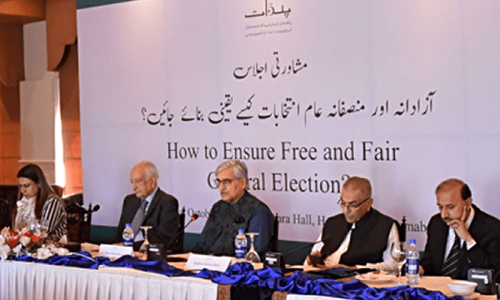ISLAMABAD: Pakistan may be one of the top 10 most digitalised societies in terms of the number of people online but most of the country’s political parties are failing to keep pace with the growing needs of digital political communications, compromising the quality of democratic discourse, said a report.
A mapping of the digital footprint of the 13 mainstream political parties analysing aspects of their political communication, conducted by the Institute for Research, Advocacy and Development (Irada), revealed that the political parties were “woefully ill-prepared to interact with citizens who are more digital savvy and digitally immersed” than leading politicians and their parties.
“The mapping shows that there is a dearth of digital literacy among not just political leadership as a distinct class but also at the level of their party apparatuses and functionaries,” said the report titled ‘Parties Online: Digitally Inadequate Political Parties Compromising Democracy in Pakistan’.
“The political agenda online is dominated by parties mainly shaped by propaganda practices – and often hate speech – rather than inclusive political communications by parties that are professedly democratic but not digitally adequate in promoting inclusive and plural democratic narratives,” it added.
The findings revealed that Pakistan’s oldest as well as newest political parties “have severe shortcomings in terms of political communication with citizens and supporters alike”.
“This comes across starkly through the snapshot study of the parties analysing two key online information mechanisms – official party websites and their official social media accounts, plus personal social media accounts of the top leadership of these political parties.”
At the launch of the report, Irada Executive Director Muhammad Aftab Alam said that with elections now announced for February 8, 2024, the report should serve as a wake-up call.
“The digital inadequacy of our political parties is compromising the quality of democracy by strengthening non-transparency around critical details about parties and therefore ends up promoting inaccessibility to the parties by their actual and potential electorates,” he added.
Key findings of study
According to the report, some of the parties do not even have official websites although some of their leaders run personal social media accounts. “Several parties do not even name their chief – the highest office holder – on their websites.”
The parties analysed for their digital political communication practices included Pakistan Peoples Party (PPP), Pakistan Muslim League-N (PML-N), Pakistan Tehreek-i-Insaf (PTI), Awami National Party (ANP), Jamiat Ulema-i-Islam-Fazl (JUI-F), Jamaat-i-Islami (JI), Muttahida Qaumi Movement (MQM), Pakistan Muslim League-Q (PML-Q), Pakistan Muslim League-F (PML-F), Balochistan National Party (BNP), Balochistan Awami Party (BAP), Jamhoori Watan Party, and the recently created Awami Muslim League Pakistan).
Most parties do not share their constitution on their websites – so neither their members have access to information about procedures on internal elections and party structures nor do the public have access to basic information about the parties’ mission, goals and objectives or party membership criteria, as per the findings of the report.
Most parties that have websites uploaded their latest manifestos for the 2018 elections. However, most of the previous manifestos have disappeared.
A majority of them share the lists of their central leaders on their websites, but half of the parties do not share lists of the leaders of their provincial chapters even though most parties have strong provincial-level political focus. Barely half of the parties share the lists of members of their central executive committees and general bodies.
Most parties are poor in archiving official party positions and decisions as most neither share minutes nor details of the party’s central executive committee and general body meetings. “This is a recipe for non-accountability as neither party members nor other party supporters can weigh a party’s democratic evolution based on leadership’s accountability to party members.”
Only four parties share either the name of their communication’s focal person on their websites or even the party’s official email address. The absence of these key details amounts to discouraging direct engagement of the electorate with the parties including by both party members or voters and media.
According to the report, not even a single party surveyed shared either the latest or previous audited reports of the party’s accounts and finances on their websites. “This lack of crucial public-interest information is tantamount to discouraging transparency and accountability on financing operational aspects of the parties.”
A majority of parties in Pakistan are active on social media and maintain official Facebook pages and official Twitter accounts. “It also appears that political parties prefer to use social media as the primary tool to communicate with their electorate instead of their website.”
Published in Dawn, November 10th, 2023














































Dear visitor, the comments section is undergoing an overhaul and will return soon.